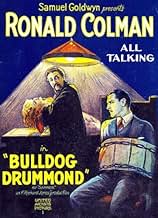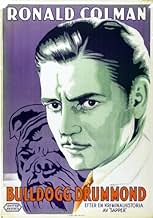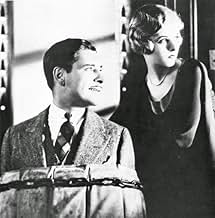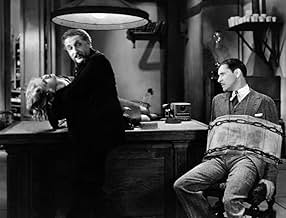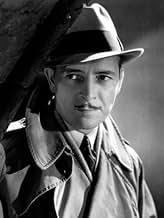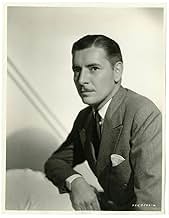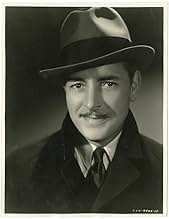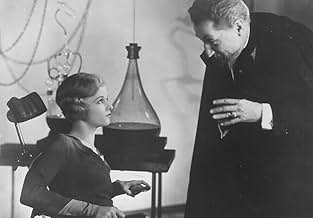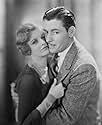CALIFICACIÓN DE IMDb
6.3/10
1.4 k
TU CALIFICACIÓN
Agrega una trama en tu idiomaA bored WWI veteran helps out a young woman whose uncle is being held hostage by embezzlers.A bored WWI veteran helps out a young woman whose uncle is being held hostage by embezzlers.A bored WWI veteran helps out a young woman whose uncle is being held hostage by embezzlers.
- Dirección
- Guionistas
- Elenco
- Nominado a 2 premios Óscar
- 5 premios ganados y 2 nominaciones en total
Claud Allister
- Algy
- (as Claude Allister)
Bill Johnson
- Little Boy
- (sin créditos)
Tom Ricketts
- Colonel in Club
- (sin créditos)
- Dirección
- Guionistas
- Todo el elenco y el equipo
- Producción, taquilla y más en IMDbPro
Opiniones destacadas
I recently watched a few early talking pictures back to back, one of them "Coquette" starring Mary Pickford and the other "Bulldog Drummond." I watched "Coquette" first and thought it was pretty representative of how terrible early talkies were. Atrocious acting, static direction, incomprehensible sound recording. But I was willing to go a little easy on it because of the limitations that existed for movies from that time period. But then I watched "Bulldog Drummond" and thought, no, it was possible to make good sound films in 1929.
"Bulldog Drummond" isn't a classic by any means, but as films from that time period goes, it's pretty easy for a modern day audience to watch. The direction and camera work are fluid; they don't have that feeling so many movies from this time period do that the camera was planted in one spot and never moved. The sound is well recorded and the dialogue easy to hear. But mostly, I was struck by how much better the acting was. This film shows why an actor like Ronald Colman went on to have a robust career in sound films while actresses like Mary Pickford did not.
Colman snagged an Oscar nomination for his performance in this film, which might seem like an oddity by today's standards, but given the competition at the time he seems to be acting in a completely different medium from so many of his contemporaries. William Cameron Menzies also received a nomination for the film's fun art direction, which runs the gamut from cozy country cottages to mad scientist laboratories.
I know this film launched a whole series, and while the original didn't leave me really inspired to watch the others, I had a good time with it.
Grade: A-
"Bulldog Drummond" isn't a classic by any means, but as films from that time period goes, it's pretty easy for a modern day audience to watch. The direction and camera work are fluid; they don't have that feeling so many movies from this time period do that the camera was planted in one spot and never moved. The sound is well recorded and the dialogue easy to hear. But mostly, I was struck by how much better the acting was. This film shows why an actor like Ronald Colman went on to have a robust career in sound films while actresses like Mary Pickford did not.
Colman snagged an Oscar nomination for his performance in this film, which might seem like an oddity by today's standards, but given the competition at the time he seems to be acting in a completely different medium from so many of his contemporaries. William Cameron Menzies also received a nomination for the film's fun art direction, which runs the gamut from cozy country cottages to mad scientist laboratories.
I know this film launched a whole series, and while the original didn't leave me really inspired to watch the others, I had a good time with it.
Grade: A-
So far, all the Ronald Coleman movies I've seen have been
silents. Therefore, I was glad to get a hold on his talkie debut,
Bulldog Drummond. As a film, it is very good. It's pretty exciting,
full of good acting from Coleman, Lilyan Tashman, Claud Allister,
Montague Love and a few others. I found Joan Bennet's work to be
pretty poor and forced. Not quite the same as that role in Woman
in the Window. Still, not bad for a first sound picture.
Since it's an early talkie, the slow-moving moments are excusable.
And there are really very few if you think about it. Plus the dialogue
was hillarious. Props to whoever came up with the role of Algy.
Deffinatly my favorite character. It's not a film everybody will enjoy,
but if you so desire it, this is a better example of a 1929 talkie.
7/10.
silents. Therefore, I was glad to get a hold on his talkie debut,
Bulldog Drummond. As a film, it is very good. It's pretty exciting,
full of good acting from Coleman, Lilyan Tashman, Claud Allister,
Montague Love and a few others. I found Joan Bennet's work to be
pretty poor and forced. Not quite the same as that role in Woman
in the Window. Still, not bad for a first sound picture.
Since it's an early talkie, the slow-moving moments are excusable.
And there are really very few if you think about it. Plus the dialogue
was hillarious. Props to whoever came up with the role of Algy.
Deffinatly my favorite character. It's not a film everybody will enjoy,
but if you so desire it, this is a better example of a 1929 talkie.
7/10.
When the first "Bulldog Drummond" stories came out in the 1920s, Great Britain was trying to come to grips with an anomaly: it had been one of the main allied victors in the Great War but the country did not feel like it won anything. It felt it had sacrificed too much.
Britain in 1914 had ruled the waves. It had a small (but apparently competent) standing army. It had a history of democracy that was stable and unmatched by any of the major continental powers of Europe. It had a very highly industrial economy and was commercially quite important on the globe. Finally, it's empire stretched around the world that the boast that "the sun never set on the British Empire" was true - it was also the world's largest empire.
In truth Britain's empire was actually wearing away. Though the British technically won the Boer War Boer Leaders ended up running South Africa. Ireland was getting hotter. The Germans helped stimulate the Easter Rebellion with arms. The British Navy did control the seas but the u-boats almost beat Britain during the war. The naval battles were marred by a total German triumph under Von Spee in the Pacific (Coronel)and the lopsided British ship and men losses at their "victory" at Jutland. Finally, Germany and the U.S. had outstripped British commerce and industrial output by 1914.
With the huge losses of a generation of men, and no tangible gains, Britain was in for a serious period of reactionary feelings and even race baiting. Anti-Semitism (always under the surface) reemerged in the 1920s, mostly due to the rise of Bolshevism in Russia after the 1917 revolutions. The political landscape did not reduce this hysteria. Lloyd George was booted out of the Prime Minister's seat forever in 1922. His successor, Andrew Bonar Law, died after nine months in office. Stanley Baldwin was not fully ready to be Prime Minister in 1923, and would blow his administration by a public hissy fit. His rival, James Ramsay MacDonald, would be the first Labor Prime Minister. But he'd been an outspoken pacifist in the war, and he was suspect of Bolshevistic sympathies (he actually had none). In the 1924 General Election a forged letter (supposedly from Gregory Zinovieff, the head of the Russian Comintern) urged MacDonald's election as an agent of the Russians. Baldwin regained office with a large majority.
It is this background that explains the popularity of "Bulldog Drummond". With governmental drift and doldrums, a declining economy, a feeling of loss of face on the international scene, and a feeling of loss due to immense death toll, the search for easy answers, easy suspects, easy enemies was ready for Sapper's poison. So the public cheered Col. Hugh "Bulldog" Drummond as he created a fascistic group of ex soldiers (like the German Freikorps) to "control" the internal enemy (i.e., Bolsheviks, Jews, Irish). I might add this was not totally made up. Lloyd George gave the go ahead while Prime Minister to create a paramilitary group in Ireland, the "Black and Tans", to combat the Irish revolutionaries. This group was finally decimated by Michael Collins' men on "Bloody Sunday" in 1921.
That Samuel Goldwyn, a Jewish American film producer, produced BULLDOG DRUMMOND, is highly ironic. But it illustrates the care Goldwyn brought to his projects. He had been producing the silent film hits that Ronald Colman appeared in in the late 1920s. Goldwyn wanted Colman to make the transition to sound carefully, and not fall on his face like Colman's rival John Gilbert. Instead of "Darling, I love you!" in HIS GLORIOUS NIGHT, Goldwyn found an exciting adventure part for Colman, which allowed him to display his wonderful, gentleman's speaking voice. As an introduction for a talking Colman, BULLDOG DRUMMOND could not be beaten.
The role had everything to show Colman's versatility. There was his humor, shown at the beginning when he is dismayed at the ridiculously boring men's club he belongs to (full of old fogies). There was his romantic side, with the youthful Joan Bennett. There is his confrontations with the sinister Lawrence Grant (Dr. Lakington) and Grant's two assistants Montague Love and Lilyan Tashman (Carl Peterson and Irma), and his handling of his impossibly stupid friend Algy (Claude Allister). As a "coming out" role for talkies, BULLDOG DRUMMOND did the trick, winning Colman the audience he feared talking films would cost him.
In terms of plot it creaks, with incredible coincidences and twists that allow plot points to fall apart for the creation of new plot points. Still the cast is game, and the script surprises us. Lakington, briefly having Drummond tied up, is speaking to him pretty closely. Colman turns his face from Grant, who accuses him of being more cowardly than he'd admit. Colman rejects this excuse. Then why turn your face away, demands Grant. "Haven't your best friends told you?", says Colman, leaving Grant turning crimson at the thought of halitosis. A later bit of business, allowing Love and Tashman to escape is also unexpected. Yes, it is an antique, but it is a charming one. And as it has none of Sapper's racist crap in it, it is highly recommended.
Britain in 1914 had ruled the waves. It had a small (but apparently competent) standing army. It had a history of democracy that was stable and unmatched by any of the major continental powers of Europe. It had a very highly industrial economy and was commercially quite important on the globe. Finally, it's empire stretched around the world that the boast that "the sun never set on the British Empire" was true - it was also the world's largest empire.
In truth Britain's empire was actually wearing away. Though the British technically won the Boer War Boer Leaders ended up running South Africa. Ireland was getting hotter. The Germans helped stimulate the Easter Rebellion with arms. The British Navy did control the seas but the u-boats almost beat Britain during the war. The naval battles were marred by a total German triumph under Von Spee in the Pacific (Coronel)and the lopsided British ship and men losses at their "victory" at Jutland. Finally, Germany and the U.S. had outstripped British commerce and industrial output by 1914.
With the huge losses of a generation of men, and no tangible gains, Britain was in for a serious period of reactionary feelings and even race baiting. Anti-Semitism (always under the surface) reemerged in the 1920s, mostly due to the rise of Bolshevism in Russia after the 1917 revolutions. The political landscape did not reduce this hysteria. Lloyd George was booted out of the Prime Minister's seat forever in 1922. His successor, Andrew Bonar Law, died after nine months in office. Stanley Baldwin was not fully ready to be Prime Minister in 1923, and would blow his administration by a public hissy fit. His rival, James Ramsay MacDonald, would be the first Labor Prime Minister. But he'd been an outspoken pacifist in the war, and he was suspect of Bolshevistic sympathies (he actually had none). In the 1924 General Election a forged letter (supposedly from Gregory Zinovieff, the head of the Russian Comintern) urged MacDonald's election as an agent of the Russians. Baldwin regained office with a large majority.
It is this background that explains the popularity of "Bulldog Drummond". With governmental drift and doldrums, a declining economy, a feeling of loss of face on the international scene, and a feeling of loss due to immense death toll, the search for easy answers, easy suspects, easy enemies was ready for Sapper's poison. So the public cheered Col. Hugh "Bulldog" Drummond as he created a fascistic group of ex soldiers (like the German Freikorps) to "control" the internal enemy (i.e., Bolsheviks, Jews, Irish). I might add this was not totally made up. Lloyd George gave the go ahead while Prime Minister to create a paramilitary group in Ireland, the "Black and Tans", to combat the Irish revolutionaries. This group was finally decimated by Michael Collins' men on "Bloody Sunday" in 1921.
That Samuel Goldwyn, a Jewish American film producer, produced BULLDOG DRUMMOND, is highly ironic. But it illustrates the care Goldwyn brought to his projects. He had been producing the silent film hits that Ronald Colman appeared in in the late 1920s. Goldwyn wanted Colman to make the transition to sound carefully, and not fall on his face like Colman's rival John Gilbert. Instead of "Darling, I love you!" in HIS GLORIOUS NIGHT, Goldwyn found an exciting adventure part for Colman, which allowed him to display his wonderful, gentleman's speaking voice. As an introduction for a talking Colman, BULLDOG DRUMMOND could not be beaten.
The role had everything to show Colman's versatility. There was his humor, shown at the beginning when he is dismayed at the ridiculously boring men's club he belongs to (full of old fogies). There was his romantic side, with the youthful Joan Bennett. There is his confrontations with the sinister Lawrence Grant (Dr. Lakington) and Grant's two assistants Montague Love and Lilyan Tashman (Carl Peterson and Irma), and his handling of his impossibly stupid friend Algy (Claude Allister). As a "coming out" role for talkies, BULLDOG DRUMMOND did the trick, winning Colman the audience he feared talking films would cost him.
In terms of plot it creaks, with incredible coincidences and twists that allow plot points to fall apart for the creation of new plot points. Still the cast is game, and the script surprises us. Lakington, briefly having Drummond tied up, is speaking to him pretty closely. Colman turns his face from Grant, who accuses him of being more cowardly than he'd admit. Colman rejects this excuse. Then why turn your face away, demands Grant. "Haven't your best friends told you?", says Colman, leaving Grant turning crimson at the thought of halitosis. A later bit of business, allowing Love and Tashman to escape is also unexpected. Yes, it is an antique, but it is a charming one. And as it has none of Sapper's racist crap in it, it is highly recommended.
This was the second film of this title, the third Bulldog Drummond film to be made, and the first with sound (this being the first year of sound films). The original 'Bulldog Drummond' was a 1922 silent, which appears to be lost, starring Carlyle Blackwell. In 1925, 'Bulldog Drummond's Third Round' appeared, starring Jack Buchanan. A print survives, and has been shown at at least one film festival, but few have had the good fortune to see it. This is the classic Drummond film in a series which was to extend to 25 films, if one counts the 1983 satire 'Bullshot'. Ronald Colman is spectacular in the lead, perfect in every way for the part, wryly humorous, dashing, ardent, impetuous but thoughtful: in short, he was the very essence of Captain Hugh Drummond. The film opens with a famous scene, an amusing long tracking shot of the interior of the 'Senior Conservative Club' (fictitious, but modelled on the Carlton Club in St. James) in London, with old gents reading or nodding off in their leather armchairs. The first two times I saw this film, I thought it was meant to be Drummond's own club. But now I am inclined to believe that it is the club of his friend Algy, whose guest he is on this occasion. Drummond says to Algy that he is bored to tears: 'I'm too rich to work, but too intelligent to play'. Algy suggests that he place an ad in The Times seeking adventure, so he drafts one on the spot stating that he finds 'peace too tedious' and invites offers of danger and adventure. The Drummond books by 'Sapper' are based on a former Army captain from the late War, who gets together a band of former soldiers who had served under him in the trenches, in order to pursue adventure in peacetime. It played to the air of total disillusion which followed the First War, similar to that which engendered film noir after the Second War. The post-War motivation is essentially absent from this film, as it was ten years on and no longer fashionable to be moaning about it. This was the first and last sound film directed by the silent director F. Richard Jones, who died of TB the next year aged only 33. The villainess of this film is played chillingly by Lilyan Tashman (astonishingly aged only 20, though playing 40), but she died aged 34 in 1934. Claud Allister is an effete Algy with a monocle, his voice shrill enough to break a wine glass. He has a wonderful moment where he is awakened by a bird popping out of a cuckoo clock, and says: 'Is it really 2 o'clock? How I do detest bird life!' Lawrence Grant is wonderfully sinister as a mad scientist with a fake asylum. The film is stagey, old-fashioned, creaks at the joints, implausible, and Joan Bennett as the girl is so pathetically helpless and whimpering that one wants to scream with frustration. She only becomes the Joan Bennet we were later to know in the love scenes at the inn towards the end, where her voice suddenly deepens and she gets that Joan Bennett glint in her eyes, and the shrinking violet begins to turn into a prowling feline. Despite any flaws, this film is a true classic, conveying as it does so much period atmosphere and the overwhelming charm of Ronald Colman, who made most films he was in into absolute 'must-sees'. If you like Colman or you like Drummond, you have to see this.
Captain Bulldog Hugh Drummond (Ronald Coleman) is bored. He is bored of peace in a contracting British empire made so by the decimation of everybody who was of fighting age in WWI. Hugh is one of the few survivors of that war and he longs for adventure. So he puts an ad in the paper saying he is looking for adventure, and would rather crime not be involved but won't rule it out.
He gets tons of responses, but the letter of Phyllis (Joan Bennett) asking for help strikes his fancy and especially the mystery she puts around their meeting. She has reserved a room for them in a local inn. On the appointed day Drummond arrives at the inn, goes to the room, and soon in walks a woman dressed from head to toe in black. She uncovers her face, and Drummond is instantly smitten. She tells a rather fantastic tale of how her fabulously wealthy uncle is being held captive in an asylum in a plot to rob him of his assets and how she is being watched by the people who run the asylum. That was why she chose the remote inn in the middle of the night. Now Drummond's friend Algie and Drummond's butler have followed Drummond to the inn, and prior to Phyllis' entry Drummond has locked them in the bedroom. While all of this conversation is going they are listening in.
Now Phyllis could have been a complete crackpot, but in the middle of their meeting in come the people running the asylum and fetch Phyllis back, validating her story. Drummond follows them, gets Phyllis out, manages to grab the uncle too, and then after some clever maneuvers in a high speed chase, makes a bone headed mistake - he takes them BOTH BACK to the inn where the villains found them in the first place. Of course they show up AGAIN. How will all of this work out? Watch and find out.
This is not to say that the villains do not make mistakes or strange decisions. They seem to be running an asylum in a huge castle like structure in which Phyllis' uncle is the only inmate. Nice work if you can get it.
This was a very well done early talkie. The entire film takes place at night, the architecture looks like something straight out of a German expressionist film, and the dialogue and performances are not static or stilted at all. There is clever use of the camera to give the illusion of motion where there really cannot be any, and the same is true for Colman's performance - he was actually wounded badly in WWI and could not use one leg hardly at all. Yet when you think back after watching, you'll swear he was climbing and swinging about like Errol Flynn.
Lilyan Tashman steals the show as the villainess, who for some reason is dressed up in an evening gown for all of this skulking about. Drummond may be her technical enemy, but you can tell by every word she says she is sexually attracted to him, if only she could get him under her spell.
This film was Joan Bennett's first talking film, Ronald Colman's second talking film and first surviving one, and Lilyan Tashman's second talking role. For these three actors, the coming of sound was a boost to their careers rather than the end of them. Of course, Colman had been a star for some years, but his marvelous voice would have made it a pleasure to listen to him recite the dictionary. Watch it for the fun, romance, and adventure of it all.
One more thing, unlike James Bond, apparently Bulldog Drummond was extremely monogamous. In the later low budget Drummond pictures of the late 30's with John Howard in the starring role Drummond is engaged to a girl named Phyllis. The joke of the series is how the planned wedding just never manages to come off because of some mystery into which Drummond becomes entangled. It's good B fun but this is the first and the best of the talking Bulldog Drummond films, largely because of the charming Ronald Colman.
He gets tons of responses, but the letter of Phyllis (Joan Bennett) asking for help strikes his fancy and especially the mystery she puts around their meeting. She has reserved a room for them in a local inn. On the appointed day Drummond arrives at the inn, goes to the room, and soon in walks a woman dressed from head to toe in black. She uncovers her face, and Drummond is instantly smitten. She tells a rather fantastic tale of how her fabulously wealthy uncle is being held captive in an asylum in a plot to rob him of his assets and how she is being watched by the people who run the asylum. That was why she chose the remote inn in the middle of the night. Now Drummond's friend Algie and Drummond's butler have followed Drummond to the inn, and prior to Phyllis' entry Drummond has locked them in the bedroom. While all of this conversation is going they are listening in.
Now Phyllis could have been a complete crackpot, but in the middle of their meeting in come the people running the asylum and fetch Phyllis back, validating her story. Drummond follows them, gets Phyllis out, manages to grab the uncle too, and then after some clever maneuvers in a high speed chase, makes a bone headed mistake - he takes them BOTH BACK to the inn where the villains found them in the first place. Of course they show up AGAIN. How will all of this work out? Watch and find out.
This is not to say that the villains do not make mistakes or strange decisions. They seem to be running an asylum in a huge castle like structure in which Phyllis' uncle is the only inmate. Nice work if you can get it.
This was a very well done early talkie. The entire film takes place at night, the architecture looks like something straight out of a German expressionist film, and the dialogue and performances are not static or stilted at all. There is clever use of the camera to give the illusion of motion where there really cannot be any, and the same is true for Colman's performance - he was actually wounded badly in WWI and could not use one leg hardly at all. Yet when you think back after watching, you'll swear he was climbing and swinging about like Errol Flynn.
Lilyan Tashman steals the show as the villainess, who for some reason is dressed up in an evening gown for all of this skulking about. Drummond may be her technical enemy, but you can tell by every word she says she is sexually attracted to him, if only she could get him under her spell.
This film was Joan Bennett's first talking film, Ronald Colman's second talking film and first surviving one, and Lilyan Tashman's second talking role. For these three actors, the coming of sound was a boost to their careers rather than the end of them. Of course, Colman had been a star for some years, but his marvelous voice would have made it a pleasure to listen to him recite the dictionary. Watch it for the fun, romance, and adventure of it all.
One more thing, unlike James Bond, apparently Bulldog Drummond was extremely monogamous. In the later low budget Drummond pictures of the late 30's with John Howard in the starring role Drummond is engaged to a girl named Phyllis. The joke of the series is how the planned wedding just never manages to come off because of some mystery into which Drummond becomes entangled. It's good B fun but this is the first and the best of the talking Bulldog Drummond films, largely because of the charming Ronald Colman.
¿Sabías que…?
- TriviaThe first (and only) sound film for former Mack Sennett director F. Richard Jones. His command of sound and action with this film was very well received, and he looked set for a bright future. Sadly, Jones succumbed to the tuberculosis epidemic that was running rampant at the time. He was only 37.
- ErroresThe players in the opening credits are set out in the form of a theatre programme. However, notwithstanding the film takes place in England, the spelling on the programme is the American 'program'. However, while the film is portrayed as taking place in England, it was produced in the U.S.; thus, the Americanized spelling of "program" in the credits is not inconsistent.
- Citas
Hugh 'Bulldog' Drummond: Danny, pack my bag. Pyjamas, toothbrush and a gun.
Danny: Please sir. Don't you really think sir? Yes sir.
Hugh 'Bulldog' Drummond: On second thought, never mind the pyjamas. Just the toothbrush and the gun.
- Créditos curiososThe cast listing resembles a play program with six listed names/roles on each of two pages. Both pages have "Program Continued" at the top of the list and "Program Continued On Following Page" at the bottom.
- Versiones alternativasWhen first released in France, the film was presented in a talkie version in English with French subtitles and in a silent version.
- ConexionesFollowed by Temple Tower (1930)
Selecciones populares
Inicia sesión para calificar y agrega a la lista de videos para obtener recomendaciones personalizadas
- How long is Bulldog Drummond?Con tecnología de Alexa
Detalles
- Fecha de lanzamiento
- País de origen
- Idioma
- También se conoce como
- Bulldog Drummond
- Locaciones de filmación
- South Bank, Lambeth, Londres, Inglaterra, Reino Unido(opening scene)
- Productora
- Ver más créditos de la compañía en IMDbPro
Taquilla
- Presupuesto
- USD 550,000 (estimado)
- Tiempo de ejecución
- 1h 30min(90 min)
- Color
- Mezcla de sonido
- Relación de aspecto
- 1.20 : 1
Contribuir a esta página
Sugiere una edición o agrega el contenido que falta

